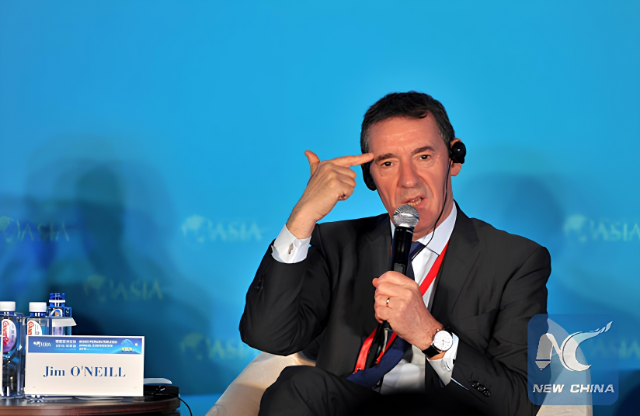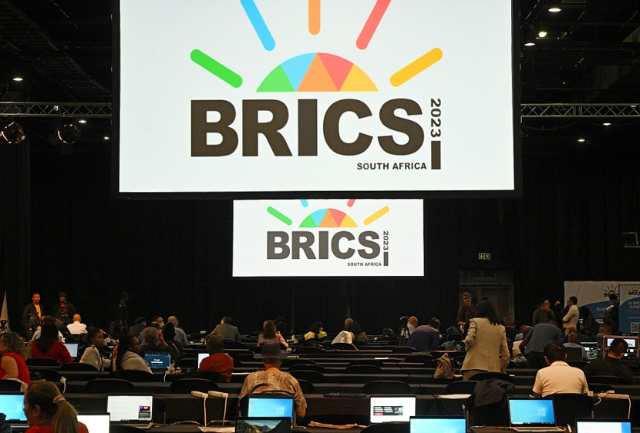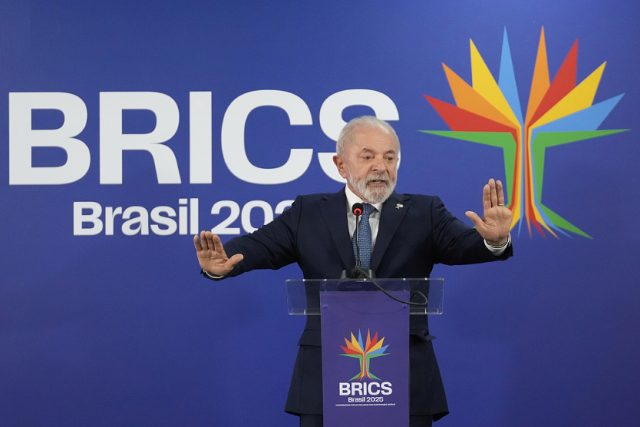Again, China and the US sit at the negotiation table face to face, conducting their fourth round of high-level talks regarding trade issues in Madrid. Earlier this month, the recent SCO summit in Tianjin and ensuing BRICS leaders' virtual summit all defended multilateralism and openness.
In a recent exclusive interview with South, Jim O'Neill, coiner of the acronym BRICS, underlined the role of BRICS+ countries in safeguarding the international trade system, with a growing focus on the group contributing more to global prosperity amid Trump's tariff measures.

Jim O'Neill (Xinhua file Photo)
Three key ingredients gestate the concept of BRIC
It has been almost a quarter-century since Jim O'Neill coined BRIC. The chief economist of Goldman Sachs published a research report in 2001 titled "Building Better Global Economic BRICs," which sought to present a world dominated by the G7. This report gained significant attention for Goldman Sachs and its clients.
"Three key ingredients drove my thinking," O'Neill outlined.
First, he considered the four founding members of the group. Clearly, China had already begun to gain global influence in terms of policy following the Asian crisis. At that time, Russia was a member of the G8. India was on the cusp of becoming a critical part of the global outsourcing chain.
As for Brazil, left-wing leader Luiz Inacio Lula da Silva was preparing to come into power but crucially indicated that he would maintain the conventional monetary and fiscal policy framework. This was a very positive sign, according to O'Neill, as Latin America's largest economy had been plagued by hyperinflation for decades.
Second, in an unusual way, O'Neill interpreted the brutal terrorist attacks of 9/11 in the US as a symbol that the world had grown weary of Americanization. "It led me to the idea that we need greater shared global governance," he added.
The final ingredient was the introduction of the euro a year later. In O'Neill's view, Eurozone and G7 members Germany, France, and Italy should make room for a better form of global governance by sharing that role instead of maintaining such a dominant position.

Journalists gather at the press centre of the 15th BRICS Summit in Johannesburg, South Africa, on August 23, 2023. (CFP Photo)
An epitome for the Global South from BRIC, BRICS to BRICS+
Since its first summit in 2009, the four BRIC states have affirmed their commitment to a multi-polar world order, appealing to more developing countries to join in development. The four members, plus South Africa in 2010, comprise BRICS and embrace BRICS+ expansions of Saudi Arabia, Iran, the United Arab Emirates, Egypt, Ethiopia in 2023, and Indonesia earlier this year.
As O'Neill analyzed, being part of a club that isn't dominated by, or even includes, the US is clearly attractive. It symbolizes to many countries in the Global South that they can feel global, rather than having the United States dictate what they must do.
Given the faster growth rates of China and India compared to any G7 country, it is evidently in those countries' self-interest to seek closer trade and investment relationships with two of the three most important countries in the world.
While BRICS+ countries are happy to be regarded as a group symbolically, they are very different nations.
If BRICS+ countries aspire to work effectively together, the creator of the acronym listed five areas for collaboration: trade, global infectious disease prevention, climate change, infrastructure development, and aid to lesser-developed countries.
In this regard, O'Neill projected that there would be a new mandate for the New Development Bank to become more active in all aspects of these areas.
Arguably, the most positive and tangible development resulting from the BRICS political group, the New Development Bank, as O'Neill proposed, could become much more significant than it currently is. Its importance does not depend solely on the bank's choices, but on what the owners and shareholders determine.
The global monetary system is changing due to the vicissitudes of relative and absolute balance among the world's largest economies. O'Neill forecasts that the Renminbi (RMB) will become more crucial unless China faces a significant crisis.
It is no surprise that as BRICS+ countries grow, China has established more arrangements with nations, such as Indonesia, where they have agreed on bilateral trade and investment arrangements in their local currencies recently.
So far this year, China has signed bilateral local currency swap agreements with over 30 central banks, with BRICS+ countries exceeding 800 billion yuan.

Brazilian President Luiz Inacio Lula da Silva speaks during a press conference at the 17th annual BRICS summit in Rio de Janeiro on July 7, 2025. (CFP Photo)
BRICS + countries' tactics to respond to Trump's tariffs
Regarding Trump's high tariffs on BRICS+ countries such as India and Brazil (50%) and China and South Africa (30%), O'Neill emphasized the need for a global trade system excluding the Trump-led United States and encouraged BRICS+ countries to pursue more free trade among themselves.
"If they do that, then the world will continue to become more prosperous, as it has been doing for the past 30, 40 years, despite all the problems," he added.
Given its share of roughly 25% of global GDP, if the US maintains its tariffs, its share will decrease, as O'Neill predicted.
In O'Neill's view, China and India are the two most critical states among the remaining 75% in terms of economic growth. Within the BRICS context, if these two countries can achieve a Dragon-Elephant Tango, it would be highly beneficial for economic development within BRICS and could serve as the foundation for a more substantive BRICS political grouping.
The former Goldman Sachs chief economist noted that Trump might be in a peculiar way doing the rest of the world a favor. He attempted to encourage other countries to be less dependent on exports to the US consumer. "Ultimately, it wouldn't be a bad thing if we had a different structure of world trade."
O'Neill does not believe that tariffs can be permanently successful, despite being a major feature of a Trump-led presidency. He predicted that the US would change course again at some point in the future.
"The idea of international trade being a win-win is true. It's just that the losers of globalization and trade need to be compensated better," he insisted.
Reporter: Zhang Ruijun
Video: Liang Zijian
Poster: Cai Junru
Script: Zhang Ruijun
Cameraman: Zhang Ruijun
Editor: Yuan Zixiang, James Campion, Shen He
Wang Yating (intern) has also contributed to the article.
















